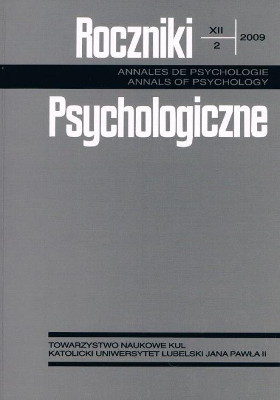Preferred values among the policemen from special Kosovo Force units
Abstract
The present study aimed at identifying the preferences of values from S. Schwartz’s model, among the policemen preparing for the peacekeeping mission in Kosovo (KFOR – Kosovo Force). The sample consisted of 89 policemen preparing for the peacekeeping mission in Kosovo (for example: antiterrorists, pyrotechnicians, detectives from Central Bureau of Invetigation – Polish FBI), 58 persons not engaged in any risk activity, 50 sports extreme risk takers (parachutists) and 60 antisocial risk takers incarcerated for having committed armed robbery. The subjects were administered the Schwartz Survey Instrument. It was found that the policemen scored significantly higher on Stimulation, Hedonism, Conformity, and Security in comparison to the group which avoided risk in their jobs. The policemen obtained higher scores concerning the following values: Tradition, Universalism, Benevolence, Security, in comparison with the parachutists. The policemen also scored significantly higher on Stimulation, Self-directed, Tradition, Benevolence, Conformity, Universalism and Security in comparison to the antisocial risk takers group.
References
Clark, D. (2005). Zachowania prospołeczne i antyspołeczne. Gdańsk: Gdańskie Wydawnictwo Psychologiczne.
Chernoff, R. A., Davison, G. C. (1999). Values and their relationship to HIV/AIDS risk behavior among late-adolescent and young adult college students. Cognitive Therapy and Research, 23, 453-468.
Goma-i-Freixanet, M. (1995). Prosocial and antisocial aspects of personality. Personality and Individual Differences, 19, 125-134.
Hampden-Turner, C., Trompenaars, A. (1998). Siedem kultur kapitalizmu. Warszawa: Dom Wydawniczy „Rebis”.
Hopper, M. (1977). Becoming a policeman: Socialization of cadets in a police academy. Urban Life, 149-168.
Lester, D. (1983). Why do people become police officers: A study of reasons and their predictions of success. Journal of Police Science and Administration, 11, 170-174.
Mądrzycki, T. (1996). Osobowość jako system tworzący i realizujący plany. Gdańsk: Gdańskie Wydawnictwo Psychologiczne.
Meagher, S., Yentes, N. (1986). Choosing a career in policing: A comparison of male and female perceptions. Journal of Police Science and Administration, 14, 320-327.
Oleś, P. (1990). Wartościowanie a osobowość. Lublin: Redakcja Wydawnictw Katolickiego Uniwersytetu Lubelskiego.
Opoczyńska, M. (1995). Człowiek wobec wartości. W: A. Gałdowa (red.), Wybrane zagadnienia z psychologii osobowości (s. 169-189). Kraków: Wydawnictwo Uniwersytetu Jagiellońskiego.
Próchniak, P. (2006). Osobiste znaczenie ryzyka w pracy zawodowej policjantów przygotowujących się do pełnienia misji pokojowej w Kosowie. Przegląd Psychologiczny, 49, 2, 203-216.
Próchniak, P. (2007). Teleologiczno-temporalny wymiar działalności ryzykownej. Słupsk: Wydawnictwo Akademii Pomorskiej.
Ragnella, A. J., White, M. D. (2004). Race, gender, and motivation for becoming a police officer: Implications for building a representative police department. Journal of Criminal Justice, 32, 6, 501-513.
Schwartz, S. (1992). Universals in the content and structure of values: Theoretical advances and empirical tests in 20 countries. W: P. M. Zanna (red.), Advances in experimental social psychology (t. 25, s. 1-65). Orlando: Academic Press.
Schwartz, S. H., Sagiv, L., Boehnke, K. (2000). Worries and values. Journal of Personality, 68, 2, 309-346.
Szuster, A. (2002). Orientacje prospołeczne a preferowanie wartości (w kategoryzacji Shaloma Schwartza). W: M. Lewicka, J. Grzelak (red.), Jednostka i społeczeństwo. Podejście psychologiczne (s. 199-216). Gdańsk: Gdańskie Wydawnictwo Psychologiczne.
Tarng, M., Hsieh, C., Deng, T. (2001). Personal background and reasons for choosing a career in policing: An empirical study of police students in Taiwan. Journal of Criminal Justice, 29, 45-56.
Copyright (c) 2009 Roczniki Psychologiczne

This work is licensed under a Creative Commons Attribution-NonCommercial-NoDerivatives 4.0 International License.


